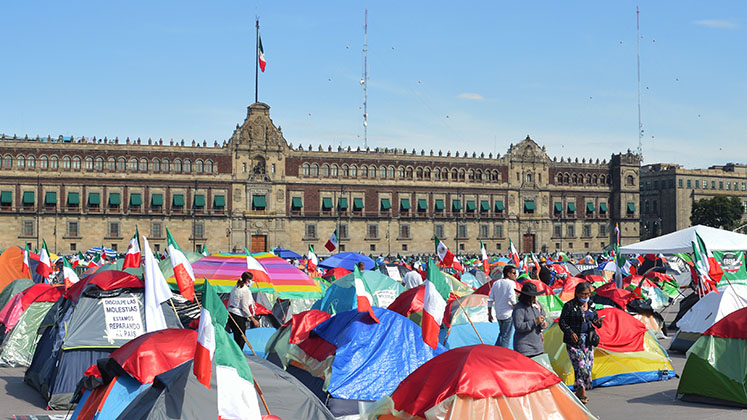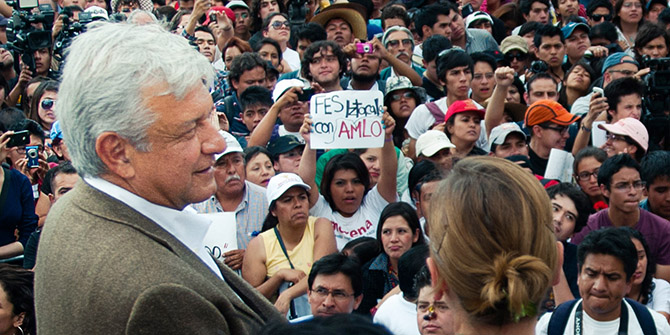
Though Bolsonaro has little relevant experience, a poor record as a legislator, and few economic, fiscal, or foreign-policy proposals, his ability to capitalise on widespread hostility to Brazilian politics and politicians has made him the second most popular candidate for the 2018 presidential election, writes Mark S. Langevin (George Washington University).
The Brazilian body politic is bruised and battered. President Michel Temer is crippled from serious charges of corruption and a 5 percent approval rating. His reform agenda is losing steam. A majority of Brazilians distrust the country’s major political leaders and parties, yet they still trust that elections are the cure for the wounds ripped open by recession, corruption, and last year’s presidential impeachment.
The moment is ripe for an outsider, a populist who can channel alienation and hostility into a presidential campaign that casts stones at the political establishment. Brazilians are considering all of their options with presidential elections less than a year away. Predictably, former President Luiz Inácio Lula da Silva leads the field, but he is followed by Jair Bolsonaro.

Bolsonaro is a former military officer turned federal deputy for the state of Rio de Janeiro. He has proved controversial and polarising, whether in his military career or his seven consecutive congressional terms. Having long occupied the margins of institutional power, Bolsonaro is now trying to break into the mainstream with a divisive, scapegoating, rant-and-rave populism.
Interests over institutions
Bolsonaro served in the Brazilian Army’s infantry as a paratrooper, reaching the rank of captain before retiring into politics in 1988. According to several of his superiors, Bolsonaro exhibited “excessive financial ambitions” and a leadership style that lacked “logic, rationality and balance.”
In 1986 he published an opinion piece in Brazil’s major weekly magazine, Veja, advocating higher salaries for soldiers and junior officers. His commanders jailed him for two weeks. Bolsonaro learned that advocacy through confrontation in the name of patriotism could elicit sympathy and galvanise political support.
While this leadership style did not work especially well in the military, the same populist mix of confrontation and flag-waving patriotism propelled his rapid rise through successive election cycles. In 1988 he won a seat on Rio de Janeiro’s city council as a member of the Christian Democratic party and followed that two years later by being voted in as a federal deputy.
He has now won seven consecutive winning elections, learning along the way how to mobilise voters frustrated by corruption, violence, and the pervasive lawlessness that Brazilians endure every day: rather than outlining policy solutions, Bolsonaro blames everybody but himself in the hope of getting a boost at the polls.
Disruption and party crashing
Bolsonaro is disruptive and disloyal. He left his military post after insubordination and later admitted to considering violence as a tactic to advance his cause of higher wages for soldiers.
During his twenty-seven years as a federal deputy he has switched political parties at least seven times. He became affiliated with the Christian Democratic Party in 1988, but since then he has been a member of the Progressive Party (2005-2016), the Liberal Front Party (2005-2005), the Brazilian Labour Party (2003-2005), the Brazilian Progressive Party (1995-2003), the Brazilian Progressive Reform Party (1993-1995), and the Progressive Party (1993).Currently a member of the Social Christian Party, he recently signalled his intention to leave for a newly formed party called Patriot.
Throughout his career he has used political parties as vehicles for his own purposes rather than as representative political organisations capable of formulating policy solutions, aggregating national interests, and electing others to office (aside from his sons and first wife).
Overall, his record reveals a pattern of disruption, political infidelity, and lots of party crashing.
Controversy over content
Bolsonaro received 120,000 votes in the 2010 elections, the eleventh highest total among candidates in the state of Rio. In 2014 he received 463,572, the most votes of any candidate.
Yet, during his seven terms in office Bolsonaro has achieved passage of only two pieces of legislation and one constitutional amendment (there are over 97 amendments to the 1988 Federal Constitution).
He sought the passage of an exemption from the Industrial Product Tax for computer purchases and another law approving the use of the controversial “cancer pill,” phosphoethanolamine. In 2015 he gained congressional approval for a constitutional amendment requiring electronic voting machines to issue a paper receipt. He has been a candidate for President of the Chamber of Deputies on three occasions, most recently this year, when he received the backing of just four of 513 federal deputies.
Overall, his track record in the Brazilian Congress is mediocre and demonstrates a lack of serious interest in legislating.
Bolsonaro’s populism works at the polls, but it appears to alienate his congressional colleagues and derail efforts to formulate serious public policy proposals to address many of Brazil’s challenges, including crime and violence – though these very issues are often the subject of his ranting and raving.

His presidential campaign, meanwhile, pivots on polarisation rather than common cause. His Facebook and Twitter posts provide a relentless stream of diatribes with which to goad his five million “friends.”
His growing notoriety stems from his passionate celebration of the military dictatorship (1964-1985), especially his honouring of former President Dilma Rousseff’s torturer when he cast his vote for her impeachment in April of 2016. He also accuses opponents of being paedophiles and communists; makes degrading statements about women, the LGBT community, Afro-Brazilians, and immigrants; and praises gun ownership in a country pockmarked by gun-related accidents and violence.
His defamations and provocations – for which he has twice been convicted – bruise and fracture the body politic, but his campaign is guided by social-media analytics rather than a sober analysis of what Brazilians need from government.
And on that score he is succeeding. Since January of 2014 Bolsonaro has registered 93.4 million Facebook interactions, compared to 66.4 million for Lula during the same period, making him the most active federal deputy on social media.
Bolsonaro’s opportunity
Bolsonaro has always been opportunistic, a political party crasher waiting for the door to open. Today, Brazil’s major leaders and political parties, including former presidents Fernando Henrique Cardoso, Lula, and Dilma, as well as the corrupt Temer administration, have swung the door wide open.
The rise of Bolsonaro and his rant-and-rave populism can only be understood by measuring the political distance that now separates most Brazilians from their representatives in Brasilia.

The Fundação Gétulio Vargas recently found that 83% of respondents disapprove of the current government, 78% disapprove of the political parties, and 78% disapprove of politicians in general. 63% stated that corruption was the major issue and 55% reported that they would no longer vote for an incumbent. Nearly a third of the respondents stated they would not cast a valid vote for the presidency in 2018, yet 65% saw elections as the best means of turning the page.
The FGV study reveals the high degree of citizen estrangement from government, but it also highlights citizen preferences for both “outsider” candidates and elections to resolve the country’s political crisis. Bolsonaro has seized on these sentiments to present himself as the outsider, the honest patriot, and the law-and-order candidate.
Bolsonaro is not an outsider, but he is different. A recent DataFolha public opinion poll on 2018 presidential candidates shows Lula in the lead with 35%, Bolsonaro second with 17%, and Marina Silva – who came third in the 2010 and 2014 elections – with 13%. But if Lula fails to overturn his conviction on corruption charges, the top two candidates would be Marina Silva (22%) and Bolsonaro (19%).
Most importantly, his supporters are disproportionately male (66%), middle-income earners with no political affiliation. Lula’s support is balanced between males and females, while 60% of Marina Silva supporters are women. Lula draws disproportionate support from lower-income earners, while Marina Silva’s support is evenly distributed. Lula’s base is associated with the Workers Party, but Marina Silva’s support is among unaffiliated respondents.
The key difference in Bolsonaro’s current support base is that this disproportionately male, middle class, and “pissed off” group is relatively unlikely to change their voting intention in 2018.
There is no guarantee that Bolsonaro will be able to take advantage of this opportunity, however, as he lacks the leadership skills to make the most of it. Unlike other leading candidates, Bolsonaro has never held an executive position, has shown no ability to lead an institution or organise a party, and has not produced economic, fiscal, or foreign-policy alternatives.
Instead, his rise relies on the political crisis, self-promotion, and political polarisation. He throws fuel on every fire but always pulls the ripcord on open debate on the public policy issues of the day. He wants to crash the party, but he doesn’t want to explain why he even came.
Some have suggested that it is best to ignore Bolsonaro and hope he goes away, but he and his followers are here to stay. It’s time that Brazilians across the political spectrum confront him with the tough policy questions before they let him through the door.
Author’s note:
I invited Federal Deputy Jair Bolsonaro to participate in a question and answer event for the Brazil Initiative at the Elliott School of International Affairs-The George Washington University in Washington, D.C. on October 13, 2017. Bolsonaro’s advisers suggested a joint activity and I agreed after stipulating that the event would be open to the public and press, and feature public policy questions offered from our faculty and students. We agreed that the questions would explore democratic governance, economic, educational, environmental, fiscal, foreign, and social policies and programs. We also agreed that the last round would be dedicated to the press. The day before the event I communicated a list of the credentialed media (including prominent Brazilian media outlets) to the Bolsonaro team. Within hours they called to cancel the event.
Notes:
• The views expressed here are of the authors rather than the Centre or the LSE
• Please read our Comments Policy before commenting






Bolsonaro is the only and one honest candidate running for presidency. He supports conservative values and free market. Criminals is killing our honest people every day and our politicians don´t care about it.Our people has been stolen by corrupt politicians all the time. Bolsonaro will restore the rule of law in Brazil. Bolsonaro will be our next president.
Let’s face it: Bolsonaro is a former militar officer who have no real experience with the public.
His beliefs are always questionable and his reputation is really low inside and outside Brazil.
I personally don’t believe that he is a honest person, after all he keep showing that he is not even suitable for ruling the country.
In fact, I’m neutral about politics since I know both left and right have their corrupt scourge.
If is to think about there is still chance of Bolsonaro losing the elections due his attitude, those who defend him are actually people who got benefits in the military regime and not workers who fear that his ascension to power might remove their rights.
We don’t need any type of military regime, no matter if they’re far right or communism since both are dirty with blood.
Me preocupo bastante com um candidato como Bolsonaro: nao tem proposta serias, nao entende nada de politica publicsa, exalta a ditadura, misosinista, a lista e’ longa. Esse candidato nao eh a melhor solucao para o pais. Precisamos de politicas publicas eficientes e um espaco democratico onde as diferencas sejam respeitads. O Bolsonoro apenas dissemina o odio e aumenta a polarizacao na politica. Medo de morar num pais onde um ser como ele eh presidente.
Matéria de um jornalista que não conhece o Brasil, a população esta cansada dos políticas de direitos humanos pra bandido, corrupção, Jair Bolsonaro é o unico fora do jogo politico, do toma la da ca, ira fazer um governo técnico, queira vocês esquerdistas ou nao. Bolsonaro2017
Caro Sergio:
certo, mas você discordo com algum fato apresentado? Sei que o povo está cansado, mas o Bolsonaro não é um outsider. Como Deputado, ele era inconsequente, e a campanha dele depende muito da crise do sistema. Será que ele está preparado de deixar a retórica e governar todos os brasileiros independentemente dos preconceitos dele?
Atenciosamente,
Mark
Concordo integralmente com a opinião expressada nesta matéria, fui aluno da LSE em 1962.